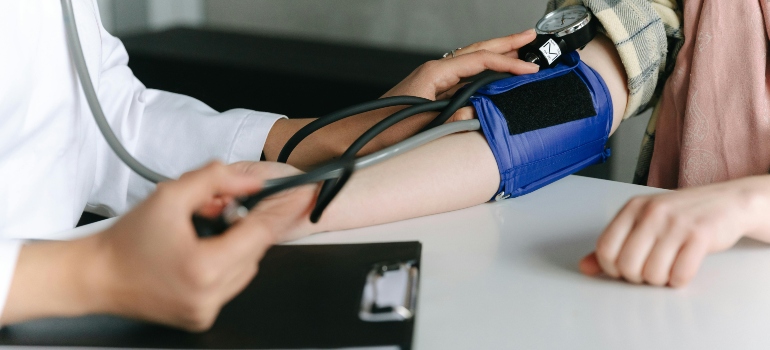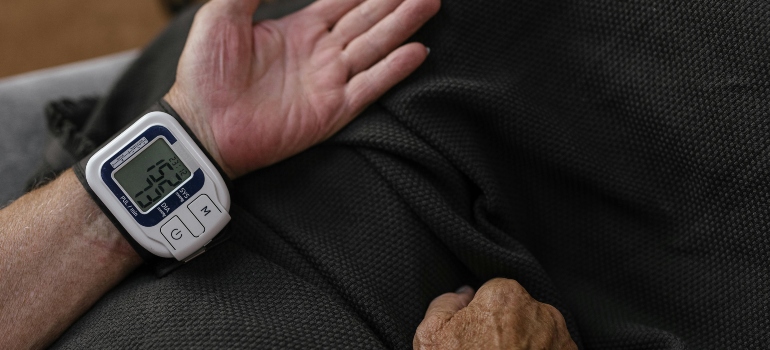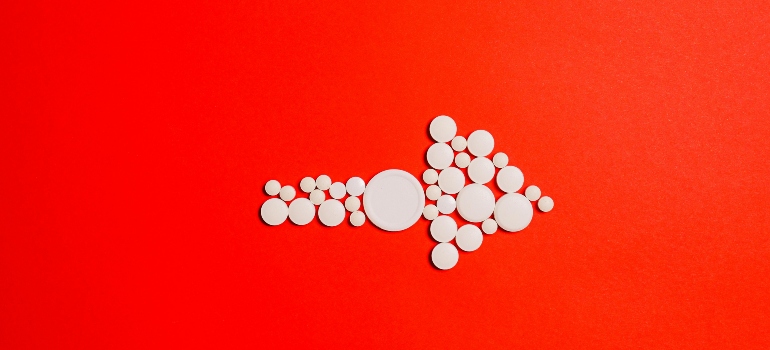Nearly half of Americans have hypertension or high blood pressure. There are several contributing factors, but alcohol consumption sets many at risk. Studies show a direct correlation between the amount someone drinks and the chances of developing high blood pressure. Does alcohol increase blood pressure? The short answer is yes. We also know that high blood pressure increases the risk of severe conditions such as stroke, heart failure, and heart attacks. Your chances of developing high blood pressure increase the more you drink beer, wine, or other alcoholic beverages.
What Does It Mean to Have High Blood Pressure?
Blood pressure fluctuates throughout the day. It’s the pressure that is pushing against the walls of your arteries. Blood pressure is measured with two numbers: systolic blood pressure and diastolic blood pressure. Systolic blood pressure is the measurement of stress in your arteries when your heart beats. Diastolic blood pressure is the measurement of stress in your arteries between beats when the heart is at rest.

The average blood pressure level is typically lower than 120 systolic and 80 diastolic, which people would refer to as 120/80, or “120 over 80.” Hypertension, which is another word for high blood pressure, occurs when someone continuously measures above normal. The higher the blood pressure, the more risk you have for serious health issues.
High blood pressure is a condition where the force of blood against the walls of your blood vessels is consistently too high. Imagine your blood vessels like pipes through which blood flows. When the pressure inside these pipes is too high, it can strain your heart and damage your blood vessels over time. Think of it like blowing up a balloon. If you blow too much air into it, the pressure inside the balloon increases, and eventually, it might burst.
Similarly, when your blood pressure is too high, it can strain your heart, leading to serious health problems like heart disease, stroke, or kidney issues. High blood pressure often doesn’t have noticeable symptoms, which is why it’s sometimes called a “silent killer.”It generally happens over time, and it’s intensified by unhealthy lifestyle choices, such as moderate alcohol consumption and lack of physical activity.
What Are The Causes of High Blood Pressure?
Your genes play a large role in your risk of high blood pressure. Several other controllable factors put many people at risk of hypertension:
- Smoking: Nicotine raises blood pressure. Breathing carbon monoxide also increases blood pressure. Carbon monoxide production occurs while smoking tobacco which limits the oxygen carried in your blood.
- Abuse of alcohol (or other substances)
- Poor diet: Low potassium and high sodium add to your risk of hypertension. Sodium is common in processed foods such as fast food, which you should avoid. Your body needs potassium to work correctly, and not eating enough potassium can increase your blood pressure.
- Physical inactivity: Regular physical activity keeps your body strong and healthy. It can help you maintain a healthy weight, but it also helps keep your blood vessels and heart in good shape.
- Having diabetes
Health Problems and High Blood Pressure
High blood pressure can have a severe effect on your health. It can hurt your organs, and it can also damage arteries, ultimately decreasing blood flow and leading to heart disease. Reduced blood flow to the heart can cause a heart attack, chest pain, or heart failure.

Heart attacks occur when your heart doesn’t receive enough blood, and the muscle starts to die due to a lack of oxygen. Heart failure occurs when the heart becomes so weak that it can no longer circulate enough blood to other organs.
In some cases, hypertension can create a blockage within arteries that supply oxygenated blood to the brain, causing a stroke. Without oxygen in the brain, brain cells die which can cause severe disabilities or death. High blood pressure may also lead to poor mental function and even dementia later in life.
Alcohol and High Blood Pressure
After drinking an alcoholic beverage, we experience an immediate rise in blood pressure. This rise regularly stabilizes within a couple of hours. Studies show that excessive alcohol use over multiple days sometimes results in a more sustained rise in blood pressure.
Since drinking regularly sustains a higher blood pressure, heavy drinking for an extended period leads to chronic hypertension. The fact that alcohol is high in sugar and calories sometimes leads to increased body weight or obesity, which is another cause of hypertension.
The American Heart Association suggests that if you do drink, “limit your alcohol consumption to no more than two drinks per day for men and no more than one drink per day for women.” A drink is considered one 12 oz. beer, 4 oz. of wine, 1.5 oz. of 80-proof spirits, or 1 oz. of 100-proof spirits.
Why Does Alcohol Increase Blood Pressure?
Alcohol increases blood pressure through several mechanisms, and understanding these can help explain why even moderate drinking can have an impact on your blood pressure over time. Here’s a simplified breakdown of the main reasons alcohol can lead to higher blood pressure:
- Vasoconstriction: Alcohol can cause the blood vessels to narrow (a process known as vasoconstriction), which increases the resistance the heart has to work against to pump blood through these vessels. It’s akin to squeezing a garden hose while trying to push water through it; the narrower the hose, the harder it is to push water through, which in this analogy, increases the pressure needed.
- Sympathetic nervous system activation: Drinking alcohol can stimulate your body’s “fight or flight” response, leading to an increase in heart rate and constricting your blood vessels. This response raises blood pressure as your body prepares for action.
- Impact on the kidneys: The kidneys play a critical role in controlling blood pressure by managing the balance of fluid and salt in your body. Alcohol can affect the kidneys’ ability to function properly, leading to an accumulation of fluid and salt, which raises blood pressure.
- Weight gain: Regular consumption of alcohol contributes to weight gain due to its high-calorie content. Increased body weight forces the heart to pump blood more forcefully through a greater amount of tissue, which can raise blood pressure.
- Interference with blood pressure medications: For those already managing high blood pressure with medication, alcohol can interfere with these drugs’ effectiveness, making it harder to control blood pressure.
How to Treat Alcohol-Related High Blood Pressure?
Reducing or quitting alcohol consumption can start the process of reducing hypertension. For those with an addiction or dependence, the initial withdrawal from alcohol can temporarily increase blood pressure.

People with an alcohol addiction will find it extremely difficult to control or even limit their consumption of alcohol. Even knowing the negative impacts, addicts may still abuse it to avoid withdrawal or emotional distress when not drinking.
Rehabilitation is sometimes necessary, and a controlled detox with supervision will make the withdrawal symptoms less intolerable.
Treatment Options For Alcoholism
There is no absolute cure for alcoholism. The good news is, there are many options available to treat it. The first step most people take is detox in rehab centers in West Virginia. As mentioned before, take this step under professional supervision to avoid possible health risks. Some people who are at risk of severe withdrawal symptoms spend days in a hospital-based setting. After a successful medical detox, the next step of rehabilitation begins.
Residential Treatment
This is a program designed for people who need support around the clock. The physical and psychological effects of addiction are strenuous, and with this treatment program, our team oversees each patient on a 24-hour basis.
After detox, patients overcome their addiction in our structured program that offers supportive emotional and medical attention. Then, a full evaluation of each patient’s needs regarding their particular circumstance begins. Each patient receives a customized plan designed by licensed medical and clinical staff. Residential treatment facilities in WV are proven effective and give patients the best opportunity for success.
Intensive Outpatient Program (IOP)
Sometimes residential treatment isn’t necessary or possible. Our intensive outpatient program West Virginia offers is a step down from an inpatient style treatment like residential treatment. It’s important to note that this program is not designed for individuals who require a medical detox.
We provide patients with social, behavioral, and psychological therapies while they continue to live at home. IOPs allow patients to continue their day-to-day lives while attending treatment in person when convenient.
Naltrexone Medication Treatment
Naltrexone is an FDA-approved prescription medication used to treat alcohol addiction. The drug decreases cravings associated with alcohol. For people suffering from an alcohol use disorder, it can be immensely beneficial. It’s unclear, though, how it reduces cravings in the brain. Side effects from naltrexone typically disappear once the body adjusts to naltrexone.

Some of the side effects of naltrexone medication treatment include:
- Diarrhea
- Headache
- Muscle or joint pain
- Abdominal pain
- Nervousness
- Nausea
- Sleep problems
- Tiredness
Partial Hospitalization Program (PHP)
For patients who need a more intensive program than standard outpatient treatment, we offer PHP. PHPs do not require patients to live in a treatment facility but provide more treatment than standard outpatient programs.
Instead of only meeting once or twice a week, patients meet at a recovery center 3 to 4 days a week for several hours a day. Patients often use a partial hospitalization program West Virginia offers once completing an inpatient program. Therefore it’s best for individuals who benefit from substantial support but do not need 24-hour supervision. Patients will engage in a variety of therapies aimed to provide care while still permitting individual freedom.
PHP does offer a variety of services, including detox for patients with mild to moderate withdrawal symptoms. Some services include:
- Medical services: In-house nurses and doctors.
- Medication management: Medication is used to promote abstinent behaviors and to help with managing withdrawal symptoms.
- Individual therapy for addiction: One-on-one counseling with a therapist.
- Group therapy for addiction: Sessions focused on specific topics facilitated by mental health professionals.
- Aftercare planning: Preparation for discharge (relapse prevention).
- Holistic treatments: Yoga, medication, nutrition, fitness, and music/art therapy.
Aftercare Programs
Recovery from addiction is a long-standing process. We offer aftercare programs for patients to continue sober living once they leave treatment. Typical forms of aftercare include outpatient treatment, individual therapy, and 12-step programs.
To continue sober living, we recommend that individuals, including family and friends, be included in the aftercare process. They need to understand how they can support sobriety and encourage healthy habits.

When a person’s treatment ends, a therapist will assist in developing an aftercare plan. The plan includes fulfilling needs such as employment, housing, or even continued treatment. We recommend people stay active in their aftercare programs for at least a year once completing inpatient treatment.
We offer many programs at Harmony Ridge Recovery Center. Our goal is to provide a comfortable and safe environment to get those struggling back on track. If you or a loved one is struggling with an addiction, please contact us today.
Does Alcohol Increase Blood Pressure?
The link between alcohol consumption and high blood pressure is both significant and concerning. Given that nearly half of Americans are already grappling with hypertension, understanding and acknowledging the role of alcohol in worsening this condition is crucial. So, does alcohol increase blood pressure? The evidence is clear: alcohol can indeed raise blood pressure, and the risk increases with the amount consumed. High blood pressure, often a silent health threat, lays the groundwork for severe and potentially life-threatening conditions such as heart attacks, strokes, and heart failure. The message is straightforward: limiting alcohol intake is a proactive step towards maintaining a healthy blood pressure level and reducing the risk of the myriad health issues associated with hypertension. For individuals struggling with alcohol dependency, seeking professional help can be a pivotal step toward recovery and better health.



